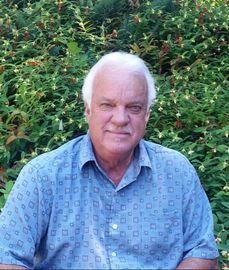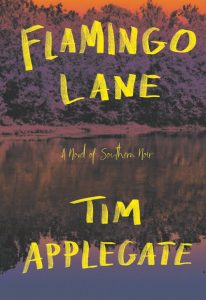 Tim Applegate is the author of three poetry collections–At the End of Day (Traprock Books), Drydock (Blue Cubicle Press), and Blueprints (Turnstone Books of Oregon).
Tim Applegate is the author of three poetry collections–At the End of Day (Traprock Books), Drydock (Blue Cubicle Press), and Blueprints (Turnstone Books of Oregon).
Born in Georgia and raised in Indiana, Tim has lived in Boston, Sarasota, Florida, and for the last twenty-four years on two acres in the foothills of the coastal range of western Oregon where he owned and operated a commercial contracting business specializing in furniture and wood restoration for the hotel and cruise ship industries.
He is the author of the novels Fever Tree (Amberjack Publishing) and the recently released Flamingo Lane (Amberjack Publishing).
You can visit his website at timapplegate.net.
Ed Battistella: Tell us about your recently released novel Flamingo Lane and your series The Yucatan Quartet.
Tim Applegate: In my new novel Flamingo Lane, to pay off an exorbitant gambling debt to the ruthless Mexican drug lord Pablo Mestival, an expat named Chance agrees to locate – and possibly eliminate – Mestival’s former lover Faye Lindstrom, who has fled Mexico and returned to her hometown. Like the other books in the Yucatan Quartet, Flamingo Lane is a standalone novel that explores the classic noir themes of greed, betrayal, and revenge.
EB: You are a writer of Southern noir? How is Southern noir different from other noir styles?
TA: Southern noir novels, exemplified by writers like Ron Rash in North Carolina and Tom Franklin in Mississippi, are often set in rural or small-town locales, and tend to feature poor or working-class characters. That said, the major elements of traditional noir – a money trail, a femme (or in many cases these days) a male fatale, a dupe – remain firmly in place.
EB: When did you first begin writing? Have you always been a writer?
TA: I began writing poetry and short fiction in high school and never really stopped. It’s been a long and sometimes difficult journey, but I can’t imagine what else I would have done with my time.
EB: What is your writing day like?

TA: I’m usually planted in front of my keyboard by 7 a.m. And I generally write/edit/revise for the next three or four hours. Of course when you’re working on a novel the story stays with you 24 hours a day, so sometimes in the afternoons I go back to the keyboard to add notes, ideas, descriptions. It’s a bit obsessive really, but there are far worse obsessions than writing books about crimes. Like committing those crimes!
EB: It’s poetry month and you have also published several collections on poetry. What does poetry mean to you?
TA: That’s an interesting question. For me, writing poetry is a way to slow the world down and focus in on something specific, a canoe trip with one of my daughters or the funeral of a friend or a memory of how cornfields looked on summer mornings in Indiana when I was a boy. It’s a way to slow down, take a deep breath, and rediscover what counts.
EB: Who are some of your poetic influences?
TA: I could name a hundred influences. But to keep the list short: Frost, Robert Lowell, Anne Sexton and Sylvia Plath. Robert Bly, Kenneth Rexroth, the Oregon poet Clem Starck. Issa, Basho, Charles Goodrich, Carolyn Forche…
EB: Can you tell us a little bit about the rest of The Yucatan Quartet?
TA: The Yucatan Quartet chronicles the lives of a group of expats who meet in a village in the Yucatan in the 1970s. Over the years, their lives continue to intersect because of certain unfortunate incidents that took place back in Mexico. Like all noir, the books go to some dark places. But there are glimmers of hope and redemption too, a faint light at the end of a long, scary tunnel.
EB: Good luck with you new book, Flamingo Lane. Thanks for talking with us.
TA: Thanks, Ed.

 Follow
Follow